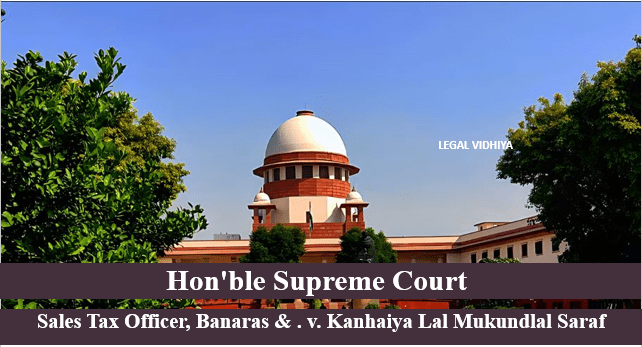
| Citation | AIR 1959 SC 135 | |
| Judgment | 23 September 1958 | |
| Bench | Sudhi Ranjan Das, C.J, K. Subba Rao, J ; K. N. Wanchoo, J ; Bhagwati, J ; B. P. Sinha, J | |
| Court | Supreme Court of India | |
| Appellant | Sales Tax Officer, Banaras & ors. | |
| Respondent | Kanhaiya Lal Mukundlal Saraf | |
| Statute | Contract Act, 1872 — Section 11, Section 20, Section 21, Section 22, Section 32 | |
Facts: Sales tax was paid by the respondent for subsequent years 1949-51. In the year 1952, the Allahabad High Court, in Budh Prakash Jai Prakash v. Sales Tax Officer, Kanpur, passed the judgment that the collection of sales tax on a particular transaction type was out of the hands of the tax office. After gaining the knowledge about this judgment, the respondent, Kanhaiya Lal asked for a refund of the amount he had paid as sales tax to the office. A writ petition was filed under Article 226 of the constitution by the respondent in order to extract the money he had paid. When the hearing for the writ petition took place it was held by the lower courts that the petitioner was not entitled for a refund. The Sales Tax Office contended that Kanhaiya Lal had paid the money and committed a mistake of law. It was also contended that the money received by the Tax office was not retained and was spent. After this judgment was passed the petitioner appealed in the High Court, the high court granted him the right to repudiation of the amount. After this judgment was passed the Tax Office appealed in the Supreme Court. Issue: Whether a mistake of law is part of Section 72 of the Indian Contract Act? Judgment: Section 72 of the Indian Contract Act states that, “A person to whom money has been paid, or anything delivered, by mistake (whether of fact or law) or under coercion, or who obtains such payment or delivery by fraud or misrepresentation or by the exercise of undue influence, must repay or return it.”In this section the term “mistake” constitutes both the mistake of fact or mistake of law. Therefore according to this section money has to be returned by the party who has been paid by any other party even by mistake of law. It was also held by the bench that a mistake of law while paying money cannot occur between parties who already have a contract which places a responsibility on the parties to make a payment. If the amount is due then paying that amount can obviously not be a mistake.Therefore a mistake of law only occurs when money is paid without any amount being due.Mistake in section 72 of Indian Contract act refers to when money is paid without it being legally due.When no money is due and no action can be taken in case of nonpayment of the money because of the situation or provisions, in that case paying money thinking that the amount is actually due is a mistake of law under this section.In short, thinking that the money is due when it is not due is called a mistake.Hence it was held that if money is paid by one party to another, it should be returned, provided that the money is not due by a contract or otherwise. Conclusion: It was also held that simply because the Tax office has failed to retain the money provided to them by the respondent and have spent it in the normal course of their action would not make a difference in the case and the respondent would still be entitled to get the money back following the plain terms provided in Section 72 of the Indian Contract act. Hence, the contentions made by the appellant were overruled and a liability was placed onto the appellant by the Supreme Court to return the money. References:https://www.latestlaws.com/latest-caselaw/1958/september/1958-latest-caselaw-81-sc/ https://lawyerservices.in/Sales-Tax-Officer-Banaras-and-Others-Versus-Kanhaiya-Lal-Mukundlal-Saraf-1958-09-23 https://indiancaselaw.in/sales-tax-officer-banaras-and-ors-vs-kanhaiya-lal-mukundlal-saraf/ This article is written by Kabir Chhibber of Vivekananda Institute of Professional Studies, an intern at Legal Vidhiya. | ||




0 Comments